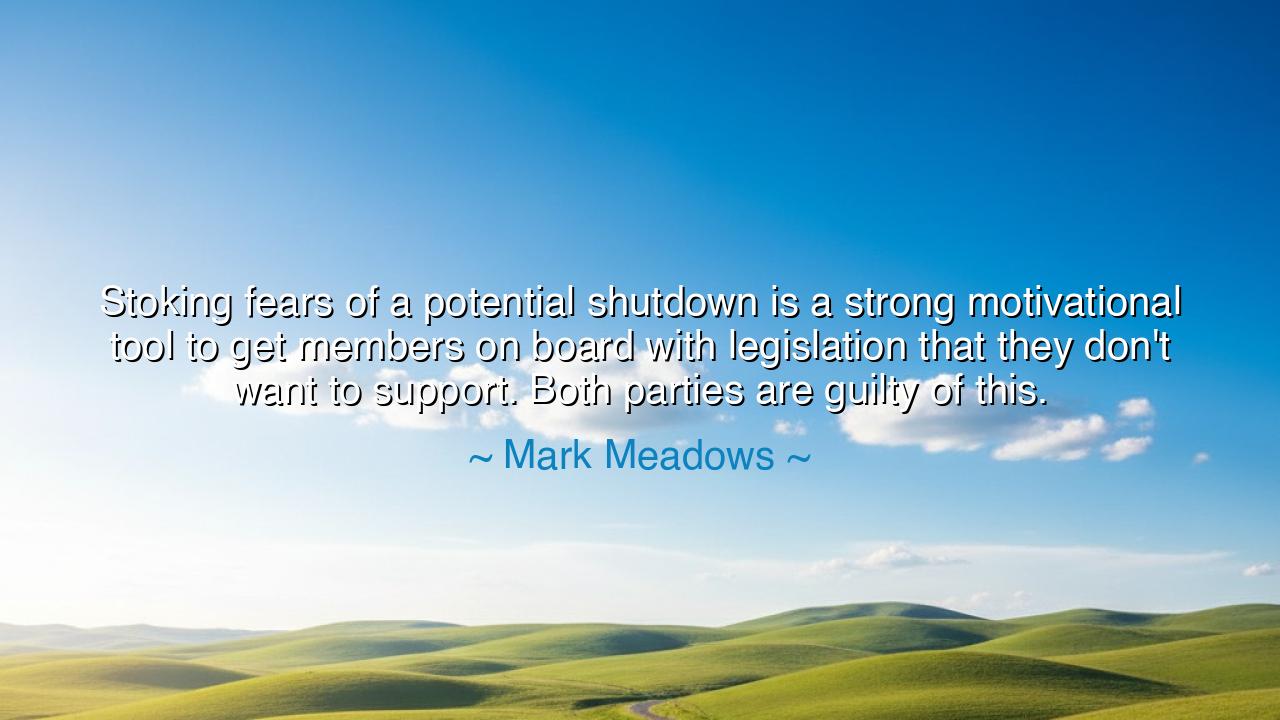
Stoking fears of a potential shutdown is a strong motivational
Stoking fears of a potential shutdown is a strong motivational tool to get members on board with legislation that they don't want to support. Both parties are guilty of this.






In the words of Mark Meadows, once a statesman at the heart of America’s political storms, we hear not merely a complaint, but a revelation of ancient truth: “Stoking fears of a potential shutdown is a strong motivational tool to get members on board with legislation that they don’t want to support. Both parties are guilty of this.” Here, in these words, is unveiled the nature of power when wielded through fear. It is not a modern practice alone, nor confined to politics. It is the timeless weapon of rulers, generals, and priests who, unable to persuade through reason, strike at the trembling heart to bend the will of men.
To threaten a shutdown is to conjure the shadow of chaos—an image of disorder, loss, and suffering. Few wish to face such uncertainty. And so, by painting the specter of collapse, leaders draw reluctant hands into agreement. This is what Meadows unmasks: the use of fear as persuasion, a fire that burns not with light but with smoke, forcing men to stumble where they might otherwise resist. And he adds with fairness that both parties are guilty. For the lust for control is not bound to one banner; it is a temptation common to all who hold authority.
The ancients, too, bore witness to such tactics. Consider Julius Caesar, who, before crossing the Rubicon, invoked the fear of instability should Rome continue under the Senate’s fractured leadership. Many who doubted him still followed, not out of pure loyalty, but out of dread of what might come if they refused. Fear bound them to his cause more tightly than admiration. And though history remembers Caesar’s brilliance, it also remembers the price Rome paid for a republic ruled by shadows and threats.
Fear, when wielded as a motivational tool, is powerful indeed—but it is dangerous. For while it can compel swift obedience, it seldom fosters loyalty of the heart. A soldier who fights because he fears his commander will flee when the commander falls; but a soldier who fights because he believes in the cause will endure even unto death. The ancients thus taught: to lead by fear is to build on sand; to lead by trust is to build on stone. Meadows’s words remind us that too often, leaders choose the easier path of fear, rather than the harder labor of true persuasion.
Yet let us not mistake this truth: fear itself is not always evil. Like fire, it may destroy, but it may also warn. A child told to fear the flame will not burn his hand. A city warned to fear famine may prepare its stores and survive. But when fear is twisted to manipulate, when it is wielded to silence conscience and force submission, it becomes poison. This is the danger Meadows names—the transformation of governance into a game where fear is the currency and truth the casualty.
The meaning, therefore, is double-edged: fear is both weapon and warning. Leaders may use it to compel, but the people must recognize when they are being driven not by wisdom, but by terror. History teaches us that empires built on fear rise quickly, but they crumble swiftly too. Recall the reign of Robespierre in revolutionary France, who ruled through the “Terror,” silencing opposition with the guillotine. At first his enemies bowed; in time, they turned, and fear devoured its master.
So the lesson for us is this: do not be ruled by fear, nor easily swayed when others wield it as a chain. Whether in politics, in work, or in life, question the voice that says, “Do this or catastrophe will come.” Ask instead: Is this action just? Is it true? Does it endure beyond the shadow of fear? If the answer is no, then you must resist, for to yield blindly to fear is to surrender your freedom.
And so, children of tomorrow, carry this wisdom: let fear be your servant, never your master. Leaders may employ it as a motivational tool, but you must not let it darken your vision. Seek the light of reason, the clarity of justice, and the strength of conviction. For it is better to stand alone in truth than to march with the multitude in fear. Thus do Meadows’s words echo the ancient call: to discern, to question, and to rise above the shadows cast by those who would rule not by trust, but by terror.






AAdministratorAdministrator
Welcome, honored guests. Please leave a comment, we will respond soon